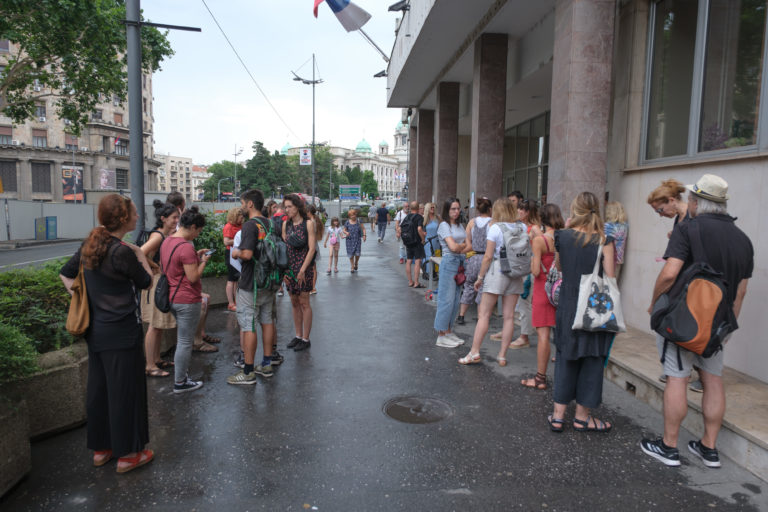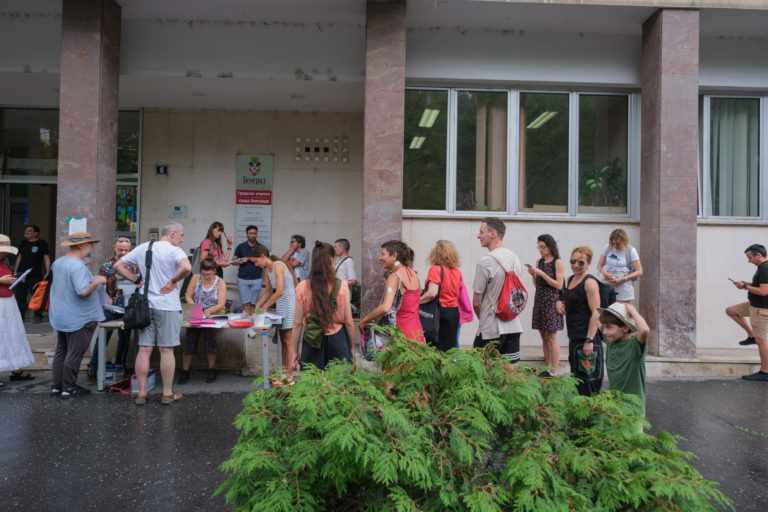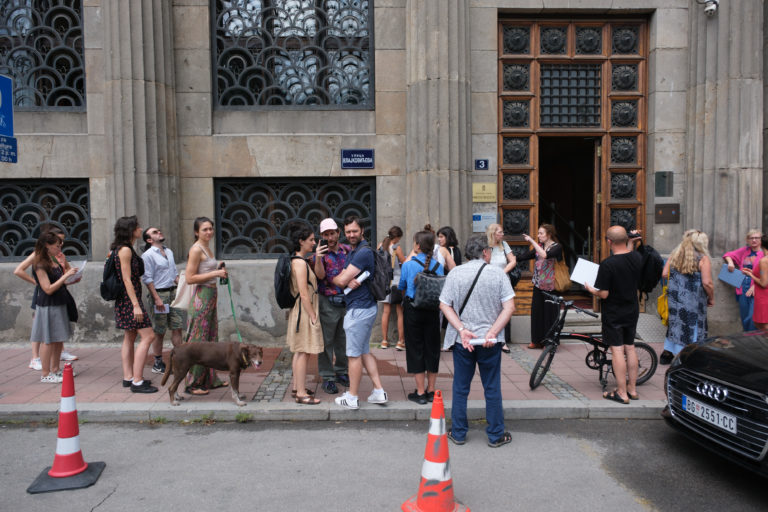Author: Vesna Milosavljević
In a follow-up to Reset!'s June 2023 newsletter entitled "Unwanted Critical Voices: The Marginalisation of the Serbian Independent Cultural Scene," this article delves deeper into the ongoing challenges faced by Serbia's independent cultural sector. For years, this sector has contended with inadequate, delayed, and opaque financial support from the Ministry of Culture and city authorities. This year, the crisis has intensified, with the Ministry of Culture failing to announce the results of its 2024 contemporary creativity competition by mid-July, and the City of Belgrade yet to publish its competition for the year, echoing a similarly dire situation last experienced in all recent years, particularly in 2020.

Protest in front of the Ministry of Culture in Belgrade on June 26th, 2024 – © Luka Knezevic Strika
For years, Serbia's independent cultural scene has struggled with insufficient, delayed, and non-transparent allocation of financial support for programmes and projects, distributed through annual competitions by the Ministry of Culture and city authorities–these annual competitions are divided in two main categories: contemporary culture and heritage, the former being divided in sectors such as visual arts, publishing, performing arts, music, etc. This year, the situation has reached unprecedented levels. As of mid-July, the Ministry of Culture has yet to announce the results of its 2024 contemporary creativity competition. Moreover, the City of Belgrade, home to the largest number of cultural civil society organisations (CSOs), has not even published its competition for this year. The only other time this lack of city support occurred was in 2020, when funding for cultural projects was redirected to so-called priority areas due to the Covid-19 pandemic.
Unprecedented Delays
In 2023, the Association of the Independent Cultural Scene of Serbia (ICSS), the Association of Fine Artists of Serbia, “Stanica” - Service for Contemporary Dance, and other organisations and individuals protested against the Ministry of Culture's delay in announcing the competition, which according to the law should be done within two months of the adoption of the State budget. This year, the situation is even more serious, as the Ministry of Culture has violated the Law on Culture by failing to announce the results of the competitions within 60 days of deadline for submitting projects. The visual arts competition, one of the first to be announced for 2024 following protests by many visual artists, had a submission deadline of December 26th, 2023, making the results almost five months overdue.
"Half of the year has passed, and out of twenty competitions in various fields, the Ministry has announced the results of only three. This has directly impacted the cultural sector, particularly independent culture, hindering numerous associations, festivals, initiatives, and projects vital to Serbian culture. It has worsened already poor working conditions and deprived citizens, especially in smaller towns and rural areas, of quality cultural programmes," says Marijana Cvetković from “Stanica” - Service for Contemporary Dance, which has three projects supported by Creative Europe, but now lacks domestic support.

Protest in front of the Ministry of Culture in Belgrade on June 26th, 2024 – © Luka Knezevic Strika
Biased Selections
Marijana Cvetković notes that since President Aleksandar Vučić's party came to power twelve years ago, the Ministry of Culture's competitions have consistently diverted support for cultural development, especially in artistic production, towards party-affiliated associations and conservative, nationalist cultural practices. This has contributed to a retrograde and conflict-oriented cultural landscape.
"The evaluation process, the composition of the commissions (which evaluate project proposals), and the justifications for supported and unsupported projects reveal a deliberately designed system to eliminate all critically-minded artistic and cultural projects. Artists and cultural workers, particularly from the independent sector, have been pointing out this 'pre-elimination' system for years, often involving the same commission members who lack relevant knowledge, insight, and basic information about trends in the fields they are supposed to be evaluating. This has proven to be a successful strategy of devaluation and anti-intellectual counter-evolution, which constitutes the official cultural policy of Serbia. The consequences include the emigration of artists and intellectuals, the undermining of public cultural institutions, the dominance of nationalist narratives in the public sphere, anti-intellectualism, and the degradation of the role of culture as an educational platform for the wider population," Marijana Cvetković explains.
She adds that the Ministry of Culture only occasionally responds to pressure from part of the cultural scene, often non-institutional. For example, on the eve of the last protest action of the ICSS on June 26th, 2024, the Ministry announced false news about the results of three competitions for 2024. In doing so, it "further humiliated the reputation of that institution and the State of Serbia as a whole", stated Marijana Cvetković. The effective results of the competition in question were announced three days later.

Protest in front of the Ministry of Culture in Belgrade on June 26th, 2024 – © Luka Knezevic Strika
Lack of Financial Opportunities and Co-financing Issues
The delay in publishing the results of competitions creates further issues for projects funded by several foreign sources available to the cultural scene, including the Creative Europe programmes. Unlike their European partners, and even some in former Yugoslav countries, which receive operational funds and multi-year project support from various government levels, Serbian CSOs in culture can only apply for specific programmes, maintaining their capacity primarily through hard work, enthusiasm, and personal financial investments, often juggling multiple jobs. Consequently, only few CSOs can lead European projects, and even those acting as partners are now withdrawing from collaborative projects due to the inability to secure necessary matching funds.
The new Minister of Culture Nikola Selaković, appointed after the snap parliamentary elections last December, previously headed the Department of Labour and Social Policy. So far, he has not made contact with critics of cultural policy from the independent scene, who have been calling for years for an increase in the budget for co-financing cultural production, especially the inadequate support for non-institutional actors. They have also raised the issue of non-competitive allocation of funds on the basis of the Minister of Culture’s discretionary power.
According to ICSS data, in 2022, more than half of the money (2.5 million euros) allocated to competitions (3.9 million euros in total for the all support for contemporary culture) was distributed through the discretionary decisions of the then minister, with more than one million dinars per project (approximately 8,500 euros). This far exceeds the amounts awarded through regular annual calls for proposals, which often amount to only €2,000 to 3,000.
Despite protests and public appeals by cultural workers and artists to the Ministry of Culture to publish the results of open calls in the field of contemporary culture, there has been no response. Unfortunately, the issue of the alarming state of culture was not even mentioned by the opposition parties during the campaign for the early parliamentary elections in December and the recent local elections in June. This leaves the independent cultural scene at the mercy of the government, which has been marginalising it for years and trying to stifle it by refusing to support it, even though it is the most important and internationally recognised part of the overall cultural and artistic production in Serbia.
Published on July 23rd, 2024
About the author:
Vesna Milosavljević is the editor and director of the SEEcult.org Portal for South-East European culture.